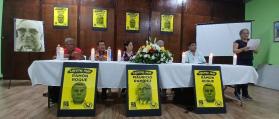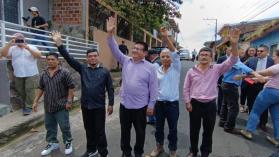New Report Details Disparate Impact of Pandemic on LGBTI Populations, Citing Non-Inclusive Public Policy
The COVID-19 pandemic hit the LGBTI population in El Salvador hard, significantly increasing structural inequalities and putting vulnerable communities even more at risk. Social movement organizations argue that this outcome is largely a result of government response and public policy that invisibilized and excluded LGBTI communities. These are among the main conclusions of a recent study from El Salvador titled “Pride, Rights, and the Pandemic: The Socioeconomic Impact of COVID-19 on the LGBTI Population of Central America, 2021.” Through interviews and surveys, El Salvador-based researchers from the LGBTI organization AMATE uncovered severe and disproportionate adversities faced by LGBTI communities in El Salvador and throughout the region over the course of the pandemic. These disparities were spread across multiple domains including healthcare, housing, and employment and also included serious human rights violations and State-sponsored violence.
Context
When COVID-19 arrived in El Salvador, LGBTI communities were already facing extremely high rates of social exclusion, stigma, discrimination, and violence. The study authors highlight that throughout Central America, colonial legacies of “exploitation of the labor force and concentration of wealth in a few hands” are maintained in the current era by neoliberal capitalist policies. The result is a region marked by deep poverty, lack of social protections, and enormous inequalities, especially for groups historically marginalized.
In El Salvador specifically, neoliberal policies have gained new momentum under the administration of President Nayib Bukele. The study points out that in the just-completed first half of Bukele’s presidency, El Salvador has seen a dramatic increase in public debt accrued through international bank loans (of the Central American countries included in the study, El Salvador had the highest increase in debt at 20.4%, followed by Honduras 11.7%, Guatemala 5.1% and Nicaragua 4.5%), attacks on labor rights, massive layoffs in the public sphere, and cuts to public services such as education and health (women’s health especially), to name a few.
Compounding the effects of these policies for the LGBTI population particularly, President Bukele eliminated very early in his term the Secretariat for Social Inclusion, which oversaw the Directorate for Sexual Diversity (the government agency charged with responding to the needs of the LGBTI community). This move was immediately and widely denounced by LGBTI organizations at the time as a hostile reversal of the gains made by the LGBTI movement under previous FMLN administrations. The result was that it left LGBTI communities even more vulnerable to discrimination, eviction, social and economic exclusion, and violence–all of which have increased under the Bukele administration with much of the violence coming from the government itself.
Disparities in El Salvador
As the study highlights, this is the context in which the COVID-19 crisis emerged, with the LGBTI population “at a much more disadvantaged starting point compared with the non-LGBTI population.” And, as the authors emphasize, “during periods of crisis, women and gender- and sexuality-diverse populations suffer most from the deepening of inequalities.” According to the study, the COVID-19 pandemic has had a deeper impact on the LGBTI population–trans people, trans women, and Indigenous trans women particularly–compared to other vulnerable groups in Central America. For the LGBTI+ communities in El Salvador specifically, the study identifies several areas in which these inequalities were seen most sharply:
Employment: Before the pandemic, 70% of LGBTI people had precarious employment, including work without a contract and/or without social security in the following sectors: informal salaried employment, paid self-employment, unpaid work, or unemployment. Once the COVID-19 pandemic began–specifically the quarantine period between March and June 2020–70% of study respondents said that their income had drastically decreased or that they had stopped receiving income altogether. Of that 70%, 43% said they had to borrow money to survive; 28% had to ask for donations; 18% did online work; and 11% performed sex work. About half of the LGBTI population experienced difficulties paying for basic services such as electricity and telephone services, rent and/or loans. One year after the start of the pandemic and despite the fact that the economy has been reactivated for the most part, unemployment continues to affect 12.5% of LGBTI people. Only 13% said they received the $300 subsidy that the government promised during the mandatory home quarantine.
Housing: The study reports that 15% of LGBTI respondents have had to move in with family or friends due to lack of income; 17% have experienced evictions or threats of eviction; 41% have suffered violence or discrimination from their families and/or neighbors in these situations. In addition, 43% reported that their current home is not equipped with basic necessities such as adequate number of rooms, bathrooms, and furniture for the number of people living in the home.
Healthcare: Approximately 50% of the LGBTI population surveyed reported obstacles in accessing medical services and medications for conditions other than COVID-19; these obstacles include suspension of public transportation, lack of money, and fear of becoming infected or being taken to a containment/detention center. In addition, of the 23% who needed specialized health services for COVID-19, almost half (45%) expressed not receiving adequate care.
Violations of human rights and State violence: A total of 28% of the LGBTI population surveyed reported being victim of discrimination, harassment, and/or violence by the police and/or military. Some mentioned that this had occurred even when these agents were carrying out humanitarian tasks such as delivering food baskets.
Other regional disparities
In the four countries studied–El Salvador, Guatemala, Honduras, and Nicaragua–disparities included higher risk for COVID-19 infection among LGBTI communities due to statistically greater pre-existing health conditions (eg, HIV positivity/low CD4 count, hypertension, and diabetes), employment in precarious and informal sectors, and crowded living conditions in which social distancing and other protocols could not be maintained. Throughout the region, quarantine measures including stay-at-home orders and isolation increased the exposure to antagonistic family members and aggravated the risk of violence against LGBTI people.
In El Salvador and Honduras especially, measures such as the militarized restriction of movement and containment/detention centers particularly affected LGBTI communities through selective and arbitrary arrests and degrading treatment. Further, the lack of identification cards matching gender identity/expression posed serious health and nutrition risks for trans people as it hindered humanitarian and medical assistance and subjected them to increased police surveillance. Overall, LGBTI communities throughout the region experienced higher rates of layoffs, evictions, starvation, and denial of medical services.
Conclusion
The study concludes with recommendations to address the disparities faced by LGBTI communities, particularly during periods of crisis. The researchers argue that in a world made increasingly precarious and unstable by neoliberal systems, public policy must respond to the needs of the populations most vulnerable within these systems during periods of crisis–whether due to health emergencies such as COVID-19 or to other escalating global risks such as climate change. Doing so is a State responsibility in accordance with international human rights standards.
The response to COVID-19 in El Salvador and neighboring countries, the authors state, “made clear the ignorance of the realities of LGBTI people.” To address this, they argue, governments must prioritize systems for “collecting social and economic indicators on the LGBTI population, which are currently not generated by public institutions,” [in El Salvador, this is partially a result of the Bukele administration’s decision to eliminate the Directorate for Sexual Diversity mentioned above]. “Survival for these communities, requires inclusive affirmative action, social protection, and care and not ‘neutral’ measures that in practice deepen inequalities.”
Similarly, instead of employing repressive State institutions such as police and military forces–which are especially violent toward gender and sexual minorities–to carry out humanitarian tasks, governments must “work closely with LGBTI community and social organizations and networks” for this work. The authors further argue that government policy in housing, employment, health, education, and beyond must “mainstream a diversity approach” to ensure that sexual orientation and gender identity are not grounds for exclusion. Social movements must guide this advance, they argue, and push for a total rearrangement of the dominant social and economic order in the region, as “neoliberal policies are unsustainable.” Without this approach, they say, future global crises will only continue to widen already existing social inequalities.

 "I am a CISPES supporter because continuing to fight for social justice and a more people-centered country means continuing the dream and sacrifice of thousands of my fellow Salvadorans who died for that vision.” - Padre Carlos, New York City
"I am a CISPES supporter because continuing to fight for social justice and a more people-centered country means continuing the dream and sacrifice of thousands of my fellow Salvadorans who died for that vision.” - Padre Carlos, New York City

